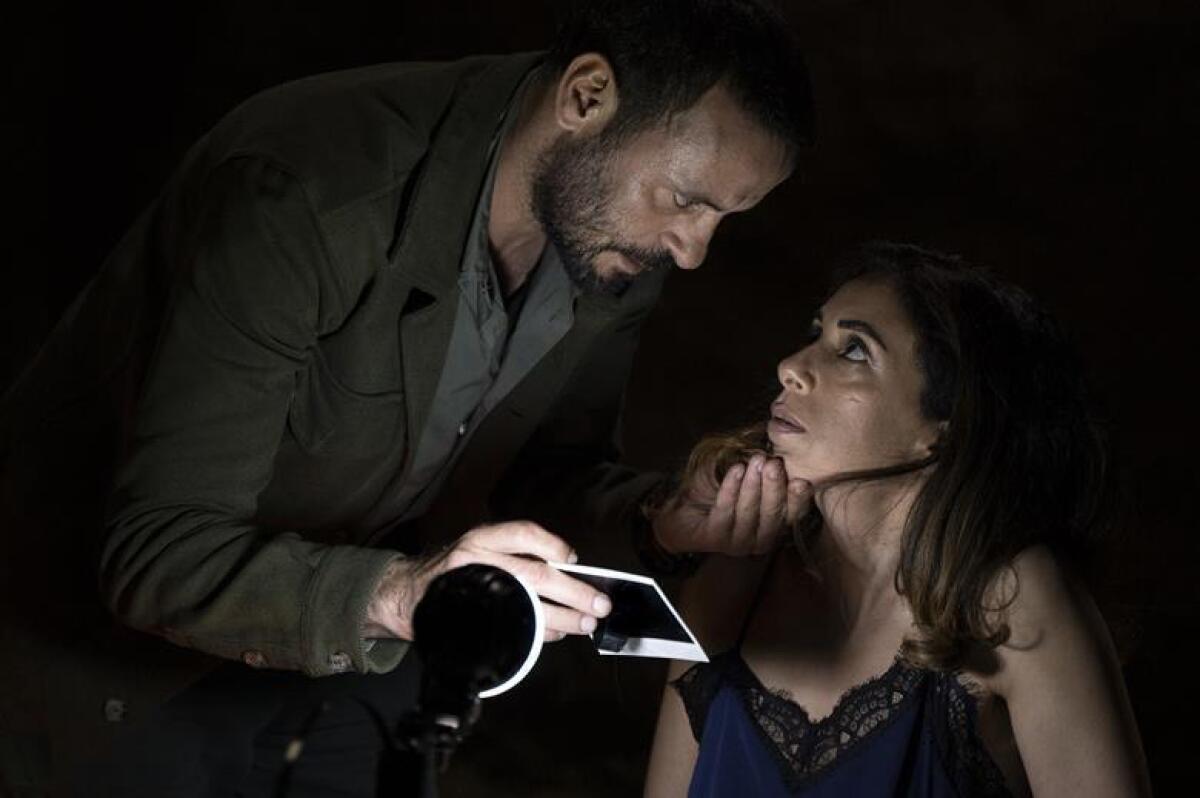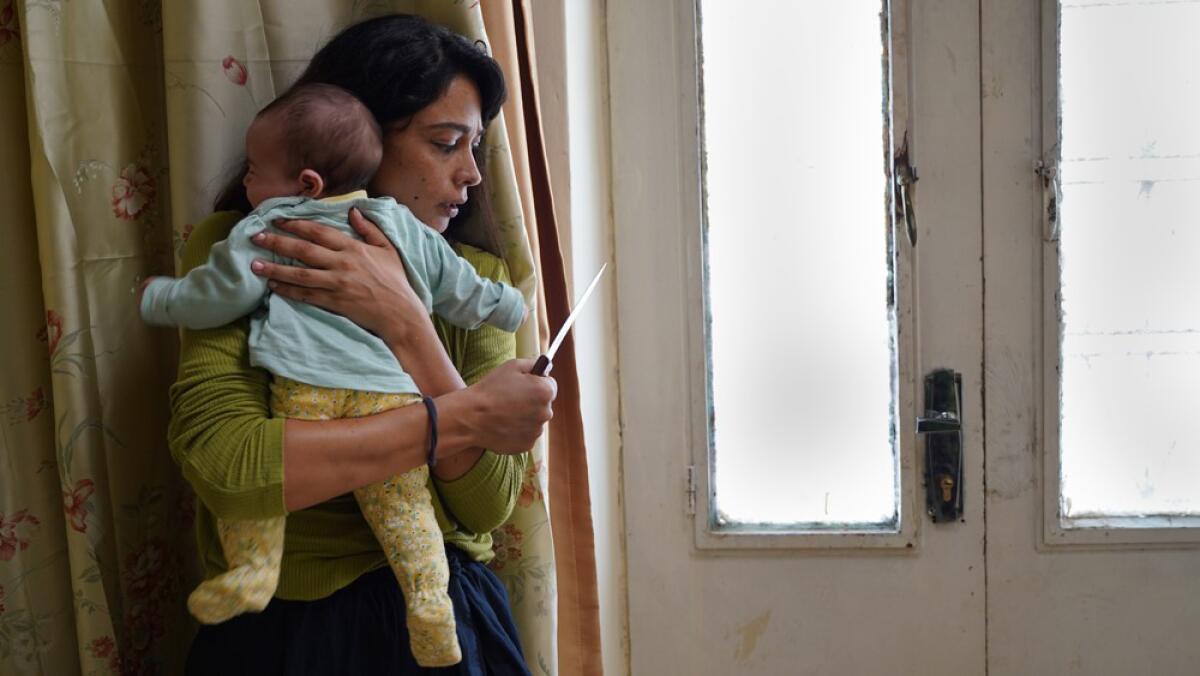Review: ‘Huda’s Salon’ shines a welcome but imperfect light on Palestinian women in turmoil

- Share via
Early on in “Huda’s Salon,” a tense, tricky psychological thriller from Palestinian writer-director Hany Abu-Assad, a woman named Reem (Maisa Abd Elhadi) races down the street in a panic, clutching her baby daughter to her breast. Reem has suffered a terrible ordeal and is anxious to get home, though for a moment she pauses beside the massive wall surrounding the city, lingering in front of a spray-painted image of the Virgin Mary and baby Jesus. Did I mention that this is Bethlehem? It’s a nervy juxtaposition, somehow both subtle and overwrought, from a filmmaker who doesn’t always trust us to grasp what he’s saying — and whose efforts to ensure that we do can be touching and maddening in equal measure.
What he’s saying is that under the weight of the Israeli occupation, the walls are always closing in for Palestinian women like Reem — and also like Huda (Manal Awad), the local hairdresser whom she’d considered, until recently, a trusted friend. The story begins with an astonishing sequence in Huda’s salon, where Reem has come for a seemingly routine appointment; the vibes are so relaxed, the chatter so casual, that it’s a shock when Reem loses consciousness and awakens, sometime later, to a shattering new reality. Huda, it turns out, works for the Israeli Secret Service, and she’s entrapped Reem, who must now become an informant herself or risk being (falsely) branded an adulteress. Reem emotionally disintegrates as only the innocent can; the guilty Huda remains impassive and unmoved: “We’re in the same boat,” she says.
For your safety
The Times is committed to reviewing theatrical film releases during the COVID-19 pandemic. Because moviegoing carries risks during this time, we remind readers to follow health and safety guidelines as outlined by the CDC and local health officials.
They are indeed, and for more than the obvious reasons. Years earlier, we learn, Huda fled a rotten marriage; Reem is stuck in one, to a jealous, controlling man named Yousef (Jamal Marsawa). It’s Yousef’s distrust that makes Reem such a vulnerable target, and while Huda insists there’s nothing personal about whom she chooses to blackmail (Reem is the latest mark of many), she clearly takes a certain satisfaction in targeting — and perhaps even liberating — the wives of raging misogynists. She’s taking aim at a Palestinian patriarchy that, in her experience and estimation, is as loathsome and oppressive as the enemy she’s aiding.
Or, in Huda’s own words: “It’s easier to occupy a society that’s already repressing itself.” She delivers that provocative line much later, from a dim underground bunker where she’s being held and questioned by Hasan (Ali Suliman), a Palestinian resistance fighter whose team has been monitoring Huda’s salon for some time. For most of its swift 91 minutes, “Huda’s Salon” proceeds along two parallel tracks: In one scene we are with Huda and her interlocutor; in the next we’re back with Reem, who grows increasingly isolated from Yousef and other family members as she tries to figure out what to do. Compounding her desperation is the knowledge that Huda has been arrested — and that the women being blackmailed, including Reem herself, likely have been exposed.

“Huda’s Salon” represents both a welcome return to home turf for Abu-Assad (whose previous film was the glossy, lousy Kate Winslet-Idris Elba survival drama “The Mountain Between Us”) and something of a departure. Admirers of his Oscar-nominated dramas “Paradise Now” and “Omar” will not be surprised by his skill at locating new sources of visceral and moral suspense — and also fresh grounds for multifaceted argument — within the Israeli-Palestinian conflict. But his specific focus on the plight of Palestinian women is new and gratifying. Working with cinematographers Ehab Assal and Peter Flinckenberg, Abu-Assad continually boxes his female leads into tight corners, visually and dramatically. Nearly every scene takes the form of a single unbroken shot, a technique that sometimes pulls you in and sometimes merely calls attention to its own virtuosity.
Huda and Reem are two very different women in peril: one older, stoic and cynical, the other younger, anxious and naive. But after their fateful opening encounter, they also inhabit two very different dramatic modes, the repeated juxtaposition of which finally makes more intellectual than dramatic sense. Reem’s story is a tense realist thriller, but the act of cutting repeatedly to and away from her plight winds up compartmentalizing rather than deepening her anguish. And despite the believably harried intensity of Elhadi’s performance, the bifurcated structure also throws the foolishness of some of Reem’s more impulsive decisions into unflattering relief.
Huda’s story, by contrast, is a rhetorical two-hander that hovers at the edge of abstraction. You can imagine it working superbly onstage; shot in pools of darkness illuminated only by the glare of an interrogation lamp, it finds Huda and Hasan, two fighters at ideological and tactical cross-purposes, coming to a grudging respect for one another, even as it’s clear there’s only one way this particular story can end. Huda knows that end is inevitable, and Awad is particularly superb — imperturbable, defiant, coolly magnetic — as a woman forced to define resistance on her own terms, who’s paid too dearly for her betrayals already to mind the final price that awaits. Even when you don’t believe the movie she’s in, you believe her entirely.
‘Huda’s Salon’
In Arabic with English subtitles
Rating: R, for disturbing violent content and graphic nudity
Running time: 1 hour, 31 minutes
Playing: Laemmle Playhouse 7, Pasadena; Laemmle Royal, West Los Angeles; Laemmle Town Center 5, Encino
More to Read
Only good movies
Get the Indie Focus newsletter, Mark Olsen's weekly guide to the world of cinema.
You may occasionally receive promotional content from the Los Angeles Times.











